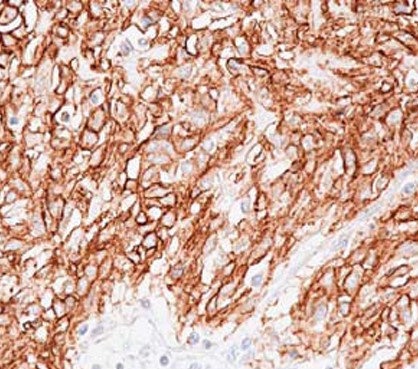Anti-DOG1 Antibody (34036)
Anti-DOG1 Antibody (34036)
Product No.: 34036
- -
- -
Clone DOG1.1 Target DOG1 Formats AvailableView All Product Type Monoclonal Alternate Names Discovered on gastrointestinal stromal tumors protein 1, Oral cancer overexpressed protein 2, Transmembrane protein 16A, Tumor-amplified and overexpressed sequence 2 Isotype Mouse IgG1 Applications IHC |
Data
- -
- -
Antibody DetailsProduct DetailsReactive Species Human Host Species Mouse Immunogen Synthetic peptide corresponding to aa 904-986 of human DOG1 (accession no. Q5XXA6). Product Concentration Lot Specific Formulation This monoclonal antibody is formulated in phosphate buffered saline (PBS) pH 7.2 - 7.4 with no carrier protein or preservatives added. State of Matter Liquid Product Preparation Antibodies are purified by a multi-step process including the use of protein A or G to assure extremely low levels of endotoxins, leachable protein A or aggregates. Storage and Handling Upon initial thawing, appropriately aliquot and store at -80°C. For long-term storage, keep at -80°C. Avoid repeated freeze-thaw cycles. Country of Origin USA Shipping Next Day 2-8°C Applications and Recommended Usage? Quality Tested by Leinco Immunohistochemistry: Use at 1- 10ug/ml on paraffin-embedded samples. Antigen retrieval solution: 10mM citrate, pH 6 (boil slides by microwaving in antigen retrieval solution for 12 minutes).User should determine optimal concentrations for their applications. Each investigator should determine their own optimal working dilution for specific applications. See directions on lot specific datasheets, as information may periodically change. DescriptionDescriptionSpecificity Mouse Monoclonal Antibody specific to DOG1 Background DOG1 (Discovered on GIST1), also known as TMEM16A and ANO1, has emerged in recent years as a promising biomarker for gastrointestinal stromal tumors (GIST). It was originally discovered through microarray expression profiling analysis as a gene that is highly expressed in GIST, and subsequent immunohistochemical studies have shown its use in its diagnosis. DOG1 antibodies are more sensitive than KIT antibodies in detecting tumors of gastric origin, tumors with epithelioid morphology, and tumors harboring PDGFRA mutation. DOG1 immunoreactivity is rarely observed in other mesenchymal and nonmesenchymal tumor types. These results support the use of DOG1 as a biomarker for GIST. Function Calcium-activated chloride channel (CaCC) which plays a role in transepithelial anion transport and smooth muscle contraction. Required for the normal functioning of the interstitial cells of Cajal (ICCs) which generate electrical pacemaker activity in gastrointestinal smooth muscles. Acts as a major contributor to basal and stimulated chloride conductance in airway epithelial cells and plays an important role in tracheal cartilage development. {PubMed:20056604, PubMed:21984732, PubMed:22178883, PubMed:22946059}. NCBI Gene Bank ID UniProt.org Research Area Cancer Research References & Citations1) Espinosa I et al. 2008 Am J Surg Pathol 32: 210-218. 2) Lee CH et al. 2010 Adv Anat Pathol 17: 222-232. |



